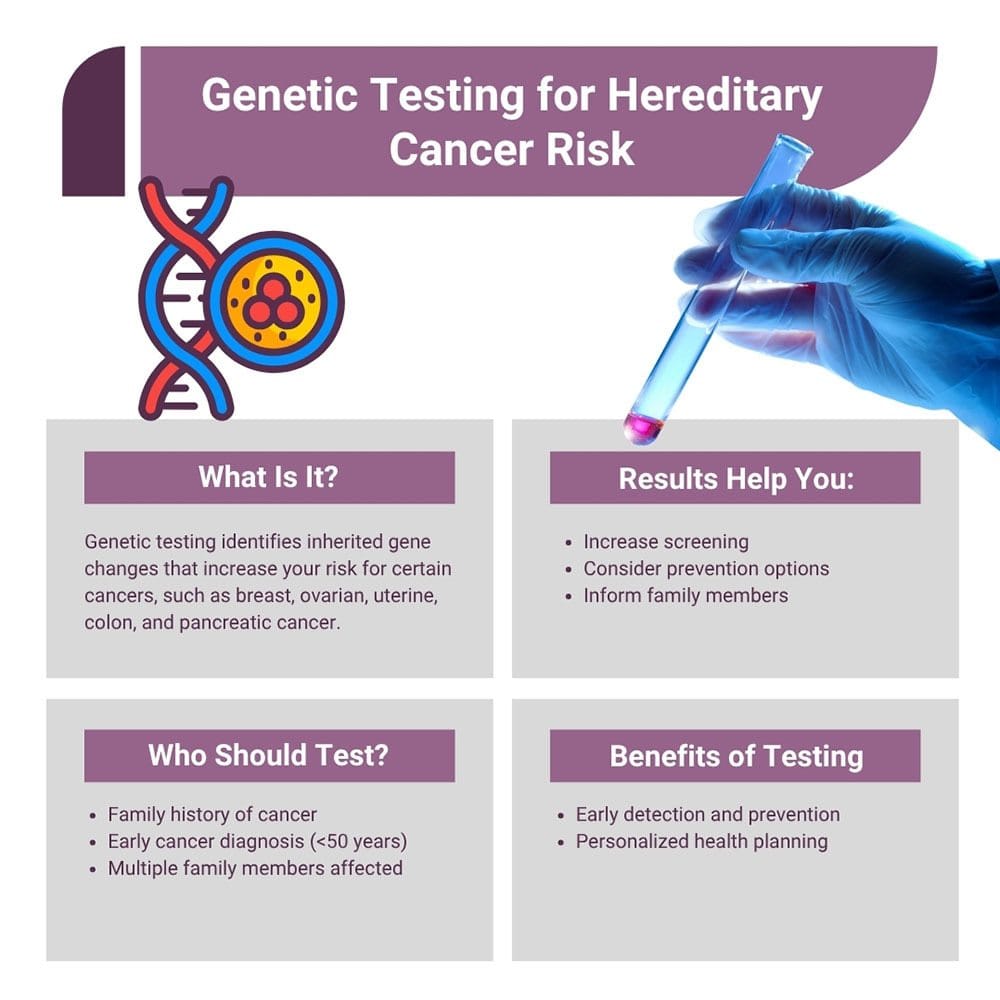Is There a Genetic Test for Cancer?
Hereditary cancer risk testing is one of the most popular genetic testing services requested. In addition to pregnancy genetic testing, people are choosing to find out about their genetic risks for many kinds of disease.
Once you know your risk level and have your options fully explained, you can take advantage of preventive measures for conditions that include:
- Breast cancer, when you’ve tested positive for the BRCA gene, associated with a high risk for the disease
- Ovarian or uterine cancer that’s more successfully treated with early detection
- Hemochromatosis that, left untreated, can lead to liver failure and diabetes
- Birth defects in your future children, as risks are sometimes predicted through preconception genetic testing
- Colon cancer and heart disease, often associated with a family history of the critical health issues and respond well to regular screenings and lifestyle changes
If you’re considering getting pregnant or looking for ways to improve your health through prevention, genetic screening may prove to be your best path forward. To receive the most accurate, compassionate guidance through the process, rely on the experience and expertise of genetic counselors at Cohen Medical Services (CMP New York). Dr. Felix Cohen is founder and director of this Midtown NYC gynecology practice, and he offers the genetic test for cancer.

Who Has High Hereditary Cancer Risk?
Anyone whose blood relative has experienced cancer is at a higher risk than people without any such family history. Hopefully, your family is open about the types of diseases that run in your family. While most family history is passed down through stories or word of mouth, medical records are available with permission from family members. Your OB/GYN at CMP New York can order those records if you have difficulty getting them from a family member.
A genetic test for cancer is useful if you have a known background riddled with various forms of cancer. It’s also helpful if you have no family history knowledge. If you were adopted, for example, you often don’t know and can’t find that information.
Other reasons you may benefit from a genetic test for cancer include:
- If you had ovarian, breast, pancreatic or colorectal cancer before you turned 50
- When a family member received a genetic test that uncovered a mutated gene
- Having a family member who’s had multiple types of cancer
- If you were born with a birth defect known to have been caused by a mutated gene for certain physical abnormalities
- More than one family member has been diagnosed with the same type of cancer
- Being a member of certain racial or ethnic groups known to be at higher risk of developing specific types of cancer
- If you’ve had cancer in a pair of matching organs, such as in both breasts or both kidneys
What Can I Do with the Results of a Genetic Test for Cancer?
After your DNA sample has been sent to a lab and the results returned to your genetic counselor, you learn the results in a consultation. Allow an experienced doctor in genetic testing to tell you the results and the options that you have once your risk levels are revealed.
A negative result means that no abnormalities were found in the sample that was tested, which may have been from a blood sample or a strand of hair. When you get a true negative, that just means that your risk level of developing cancer is no greater than the rest of the population.
Your trained genetic doctor explains your options if you receive a positive result from early cancer detection testing that may include:
- Getting the rest of your family tested so you can monitor them for early signs of cancer
- Deciding whether you want to expose future generations to the risks
- Receiving psychological and emotional support
- Undergoing preventive medical procedures, such as a mastectomy, if it’s determined you carry the BRCA gene for breast cancer
- Following up with other preventive measures, such as hormone replacement therapy, often cited as a step in cancer prevention
- Assessing the potential effects of telling your family members about the results
- Enhancing your own screening by getting checkups and screenings more often
What Benefits Can I Get from Testing for Hereditary Cancer Risk?
In addition to the obvious preventive steps you can now take to manage your cancer risks when you receive a positive test, you also get a significant level of positive benefits from undergoing a genetic test for cancer, including:
- Peace of mind that you don’t have to worry about living with high risks
- Guidance about the best treatment if you’ve already been diagnosed with cancer
- Grounds for other family members to undergo testing
- Ability to make substantial lifestyle changes to reduce the risk levels
For genetic counseling in New York City designed to give you the peace of mind and solid medical guidance you need should you test positive for a hereditary cancer risk, contact CMP New York for a consultation.

